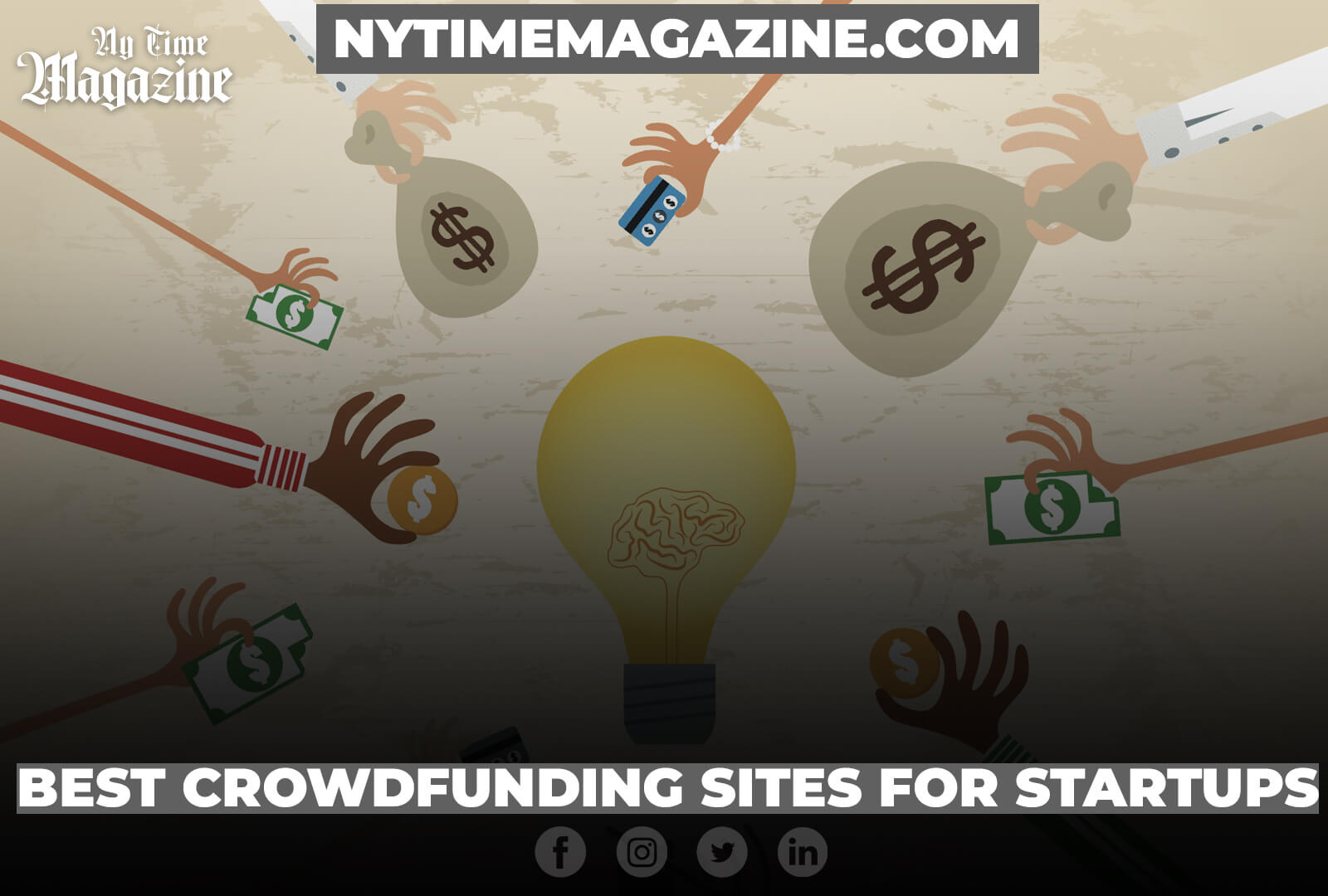When it comes to crowdfunding for startups, selecting the right platform is akin to laying the foundation for your entrepreneurial journey. The digital landscape is teeming with crowdfunding websites for startups, each offering a unique approach to crowdfunding business startup initiatives. In this guide, we explore the best crowdfunding sites for startups, shedding light on their strengths and limitations, helping you navigate the complex terrain of equity crowdfunding for startups.
Contents
- 1 1. StartEngine: Empowering Growth Through Equity
- 2 2. Indiegogo: Where Creativity Meets Capital
- 3 3. Kickstarter: Pioneering the Future of Crowdfunding
- 4 4. Fundable: Tailored Solutions for Tech Entrepreneurs
- 5 5. CircleUp: Elevating Consumer Product Startups
- 6 6. Patreon: Empowering Creative Minds
- 7 7. Wefunder: Fueling High-Growth Dreams
- 8 8. IFundWomen: Championing Women Entrepreneurs
- 9 9. GoFundMe: Transformative Funding for Social Entrepreneurs
- 10 10. Crowdcube: Nurturing Early-Stage Innovations
- 11 11. MicroVentures: Facilitating Tech Innovations
- 12 12. Seedrs: Fostering Sustainable Entrepreneurship
- 13 13. Mightycause: Empowering Nonprofits
1. StartEngine: Empowering Growth Through Equity
Best for: Startups with long-term vision, growth-focused startups
Pros:
- Excellent reputation in equity crowdfunding for startups.
- Startup founders retain control of their offerings.
- Funding can be collected immediately after reaching $12,000.
Cons:
- Limited to US-based startups.
- Maximum funding amount capped at $50 million (Regulation A+) and $1.07 million (Regulation crowdfunding).
- Minimum funding goal of $10,000 applies.
2. Indiegogo: Where Creativity Meets Capital
Best for: Startups overall, early-stage startups
Pros:
- Available in 235 countries and territories.
- Flexible campaign requirements.
- Integration with Facebook and Google for better promotion of crowdfunding websites for startups.
Cons:
- Additional third-party payment processing charges apply.
- High competition due to the large number of campaigns in the realm of crowdfunding for startups.
3. Kickstarter: Pioneering the Future of Crowdfunding
Best for: Tech startups, art, and design startups
Pros:
- Trusted and well-known platform in the world of crowdfunding business startup.
- Access to a vast network of over 15 million project backers globally.
- Services available in 25 countries, enhancing the global scope of crowdfunding for startups.
Cons:
- Highly competitive approval process in the domain of crowdfunding for startups.
- Campaigns must fit into predefined categories, limiting the options for crowdfunding business startup enthusiasts.
4. Fundable: Tailored Solutions for Tech Entrepreneurs
Best for: Tech startups, high-growth companies (US-based)
Pros:
- Equity crowdfunded campaigns can retain funds even if the goal isn’t met.
- Low monthly flat fee for subscribers venturing into equity crowdfunding for startups.
- Access to additional resources amplifies the appeal of crowdfunding websites for startups.
Cons:
- Funding retention depends on goal achievement, a common challenge in crowdfunding for startups.
- Mandatory platform fee, regardless of campaign success, impacting small business funding for startups.
5. CircleUp: Elevating Consumer Product Startups
Best for: High-growth startups, early-stage startups, consumer product startups
Pros:
- Strictly for accredited investors, ensuring the credibility of crowdfunding websites for startups.
- High campaign success rate, facilitating small business funding for startups.
- Selective acceptance enhances funding chances for consumer product startups.
Cons:
- Rigorous application process, a challenge faced by many small business funding for startups initiatives.
- Limited to product-centric startups, impacting the diversity of crowdfunding business startup campaigns.
6. Patreon: Empowering Creative Minds
Best for: Art startups, lifestyle startups, small businesses
Pros:
- Monthly subscription setup available for crowdfunding business startup enthusiasts.
- Flexible funding options suitable for creative professionals.
- Easy campaign promotion through integrations, a boon for art startups and lifestyle startups.
Cons:
- High platform fees, affecting the overall profitability of small business funding for startups.
- Not ideal for high-growth startups, diverting the focus from equity crowdfunding for startups to creative ventures.
7. Wefunder: Fueling High-Growth Dreams
Best for: High-growth startups, tech startups, equity-based startups
Pros:
- High success rate (approximately 75%) attracts enthusiasts of equity crowdfunding for startups.
- Access to legal and crowdfunding support resources, aiding small business funding for startups.
- Relatively inclusive despite being an equity platform, encouraging crowdfunding for startups from diverse backgrounds.
Cons:
- Stringent legal requirements pose challenges for those exploring equity crowdfunding for startups.
- Unsuitable for small businesses or lifestyle startups, narrowing the scope of crowdfunding business startup initiatives.
8. IFundWomen: Championing Women Entrepreneurs
Best for: Women-led startups, purpose-driven startups, food and beverage startups
Pros:
- Tailored for women entrepreneurs, bridging the gap in crowdfunding for startups.
- Extensive support, including coaching and networking, empowers women-led startups.
- Campaign funds retained regardless of goal achievement, nurturing the growth of food and beverage startups.
Cons:
- Generally lower capital raised, impacting the financial stability of women-led startups.
- Limited comprehensive statistics on success rates, hindering strategic planning for crowdfunding for startups.
9. GoFundMe: Transformative Funding for Social Entrepreneurs
Best for: Social entrepreneurs, nonprofits, eco-friendly startups
Pros:
- 0% platform fee; funds retained regardless of goal achievement.
- Suitable for socially impactful startups and eco-friendly startups.
Cons:
- Reports of low campaign success due to saturation, challenging the viability of crowdfunding for startups.
- Strict requirements limit startup eligibility, particularly for eco-friendly startups.
10. Crowdcube: Nurturing Early-Stage Innovations
Best for: Early-stage startups, growth startups (England-based)
Pros:
- Access to high-reward startups with low minimum contributions, fostering growth for early-stage startups.
- Platform handles paperwork and tax certificates, easing the burden for growth startups.
- Quarterly investor updates required, promoting transparency for crowdfunding for startups initiatives.
Cons:
- Limited to UK residents or legally eligible investors, constraining the reach of early-stage startups.
- Qualified as an educated investor required, setting a higher bar for crowdfunding for startups endeavors.
11. MicroVentures: Facilitating Tech Innovations
Best for: Early-stage startups, late-stage startups, tech startups
Pros:
- Open to both accredited and non-accredited investors, broadening opportunities for tech startups.
- Small minimum investment of $100 for Regulation Crowdfunding, enhancing accessibility for early-stage startups.
- Comprehensive due diligence for applying companies ensures the quality of tech startups in the realm of crowdfunding for startups.
Cons:
- Limited investment opportunities, posing challenges for late-stage startups in crowdfunding for startups.
- Few educational resources for investors, potentially hindering informed decision-making for tech startups.
12. Seedrs: Fostering Sustainable Entrepreneurship
Best for: Early-stage startups, growth startups, sustainable startups
Pros:
- No holding charge for investors, maximizing returns for sustainable startups.
- Accessible to accredited and non-accredited investors, enhancing opportunities for early-stage startups.
- Offers a secondary marketplace for shares trading, ensuring liquidity for growth startups in the sphere of crowdfunding for startups.
Cons:
- No mobile capabilities, impacting the user experience for crowdfunding for startups enthusiasts.
- Overwhelming number of available companies, necessitating strategic planning for sustainable startups.
13. Mightycause: Empowering Nonprofits
Best for: Nonprofits
Pros:
- Extensive free resources for non-profits, fostering growth and sustainability.
- Lower commission rates for members, ensuring maximum impact for nonprofits.
Cons:
- Limited potential for high investment returns, a characteristic common to crowdfunding for startups in the nonprofit sector.
Conclusion: Choosing Your Path in Crowdfunding for Startups
In the intricate realm of crowdfunding for startups, the choice of platform can make or break your entrepreneurial dreams. Whether you are delving into equity crowdfunding for startups, exploring small business funding for startups, or pioneering crowdfunding business startup ventures, these platforms offer unique avenues for growth.
Remember, the right platform aligns with your vision, amplifying your reach and impact. Evaluate your goals, connect with the right audience, and embark on your crowdfunding journey with confidence. The world of crowdfunding for startups awaits, offering boundless possibilities for your entrepreneurial endeavors.



